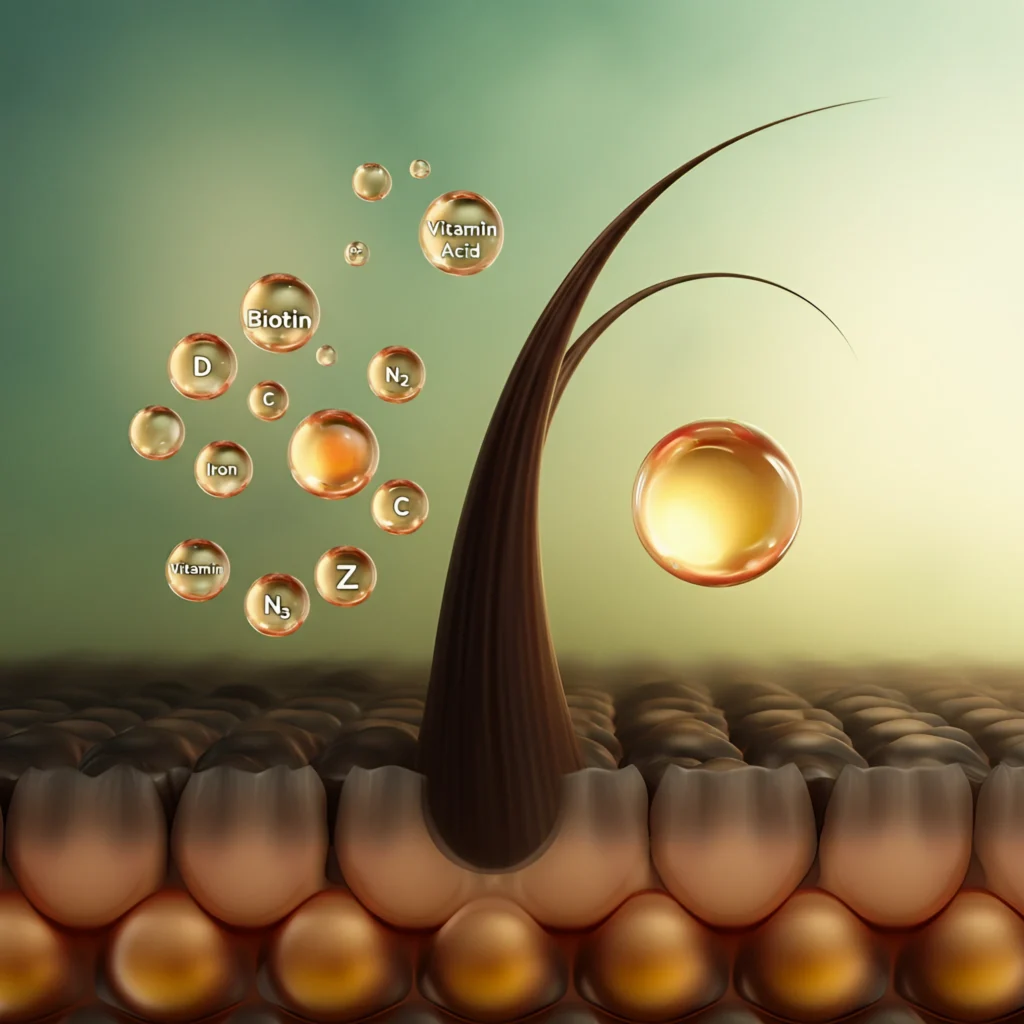
Have you noticed more hair in your brush or drain than usual? Hair health is closely tied to our overall nutrition, and deficiencies in certain vitamins can contribute to thinning hair, slow growth, and even prevent our locks from looking their best.
While genetics, lifestyle, and environmental factors all impact hair health, getting the right nutrients can significantly promote stronger, shinier, and healthier hair. Let’s explore the top five vitamins essential for hair growth and how they contribute to luscious, vibrant locks.
What Are the Most Essential Vitamins for Hair Health?
1. Biotin (Vitamin B7): The Hair Saver
Often hailed as the “hair growth vitamin,” biotin is known for its ability to strengthen hair and improve its elasticity. Biotin promotes keratin production, an essential protein that forms the foundation of our hair.
Why It’s Important:
Biotin deficiency, though rare, can lead to thinning hair and brittle nails. When supplemented, it may help thicken strands and improve hair texture in cases of deficiency.
Natural Sources:
- Eggs
- Nuts and seeds (e.g., almonds, sunflower seeds)
- Spinach
- Sweet potatoes
2. Vitamin D: The Follicle Stimulator
Vitamin D supports the creation of new hair follicles and is a vital nutrient for the hair growth cycle. Unfortunately, many adults, especially those in colder climates, are deficient in this essential vitamin.
Why It’s Important:
Studies show that vitamin D deficiencies are often linked to hair loss conditions like alopecia areata and female pattern hair loss.
Natural Sources:
- Fatty fish (salmon, mackerel)
- Egg yolks
- Fortified foods (milk, orange juice)
- Sunshine (yes, get outside!)
Expert Tip:
Doctors often recommend taking 2,000–5,000 IU of vitamin D daily for those with a low blood level. Always consult a healthcare provider before supplementing.
3. Vitamin A: Essential for Sebum Production
Did you know your scalp needs natural oils (known as sebum) to stay moisturized and healthy? Vitamin A supports oil production and promotes healthy growth cycles by nourishing the scalp.
Why It’s Important:
A lack of vitamin A can lead to dry, brittle hair and a flaky scalp. On the flip side, too much vitamin A can cause hair to fall out, so balance is key.
Natural Sources:
- Carrots
- Sweet potatoes
- Spinach
- Mangoes
Warning:
Avoid megadoses! Vitamin A toxicity can trigger hair loss, nausea, or even headaches. Stick to the recommended daily allowance.
4. Vitamin C: The Collagen Builder
Vitamin C does more than boost your immune system. It plays a critical role in collagen production, a structural protein that strengthens hair and prevents breakage.
Why It’s Important:
If you’re iron deficient, vitamin C can help your body better absorb non-heme iron from plant-based foods, indirectly supporting hair growth.
Natural Sources:
- Citrus fruits (oranges, lemons)
- Bell peppers
- Strawberries
- Broccoli
5. Vitamin E: The Antioxidant Hero
Vitamin E protects your scalp and hair from oxidative stress caused by free radicals. Think of it as your hair’s superhero, fighting off environmental damage.
Why It’s Important:
Vitamin E has antioxidant properties that boost scalp circulation, creating an ideal environment for hair to grow. Low levels have been linked to poor hair health.
Natural Sources:
- Sunflower seeds
- Almonds
- Avocados
- Spinach
The Role of Minerals in Hair Growth
While vitamins play a crucial role, some minerals are equally vital for keeping your hair thick, shiny, and resilient.
Key Minerals for Hair Health
- Iron: Common in women, iron deficiency can lead to hair thinning and slow growth. Red meat, lentils, and leafy greens like spinach are excellent sources.
- Zinc: This mineral supports hair tissue repair and function. Find zinc in oysters, pumpkin seeds, and fortified cereals.
- Magnesium: It boosts keratin production and helps regulate hair follicle growth. You’ll find magnesium in bananas, avocado, and beans.
Hair Loss Types and Nutritional Impacts
Here are the most common hair loss types influenced by nutrition and health factors.
1. Androgenetic Alopecia (Pattern Hair Loss)
This genetic condition causes thinning at the crown in women or a receding hairline in men. While not caused by nutrition, a healthy diet may slow down progression.
2. Telogen Effluvium (Stress-Related Shedding)
Do you notice more hair fall after stress, illness, or surgery? This condition is often temporary and can also result from deficiencies in iron or zinc.
3. Alopecia Areata (Autoimmune Condition)
This occurs when the immune system attacks hair follicles, causing patchy hair loss. Certain vitamins, like vitamin D, may play a supportive role in treatment.
Why a Balanced Diet Matters
Your diet is the foundation of healthy hair. While supplements can help fill gaps, the most effective way to promote hair growth is a balanced intake of all essential nutrients.
Tips for a Hair-Friendly Diet
- Eat a variety of whole foods (fruits, veggies, lean proteins).
- Incorporate healthy fats like avocados and nuts.
- Stay hydrated with plenty of water to keep your scalp nourished.
Remember, no “magic pill” can rejuvenate damaged or nutrient-deprived hair overnight. Consistency is key!







